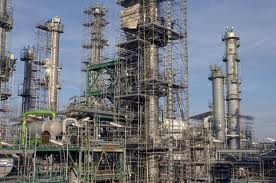
Nigeria’s four oil refineries were operating at between 60 and 75 percent capacity after production restarted last week following closures caused by pipeline sabotage, the state oil firm said on Wednesday.
Nigeria has two refineries in its main oil-hub Port Harcourt and one each in the Niger Delta town of Warri and in Kaduna, a city in the central region of Africa’s most populous nation. The plants have a total capacity of 445,000 barrels per day (bpd).
“Warri is up to 75 percent and the rest are between 60 and 70 percent,” NNPC spokesman Levi Ajuonoma said.
“In another couple of weeks we will be ramping up production. The key is pipeline security,” he added. When asked if security had been bolstered Ajuonama said “yes it has”.
A series of militant sabotage attacks to feeding pipelines in December forced NNPC to shut all its refineries but operations by a military task force has tempered volatility in the Niger Delta. Militants have threatened more attacks.
Nigeria is Africa’s largest crude exporter, shipping more than 2 million bpd to thirsty consumers in the U.S., Europe and Asia, but sub-Saharan Africa’s second largest economy has to rely on imports for 85 percent of its fuel needs.
Dilapidated infrastructure, ageing plants and a lack of investment have held back Nigeria’s refining industry for years, while militant attacks worsen the situation.
Onshore oil infrastructure in the Niger Delta, a network of shallow creeks opening into the Gulf of Guinea, is extremely exposed, with thousands of kilometres (miles) of pipeline passing through remote and thickly forested terrain.


